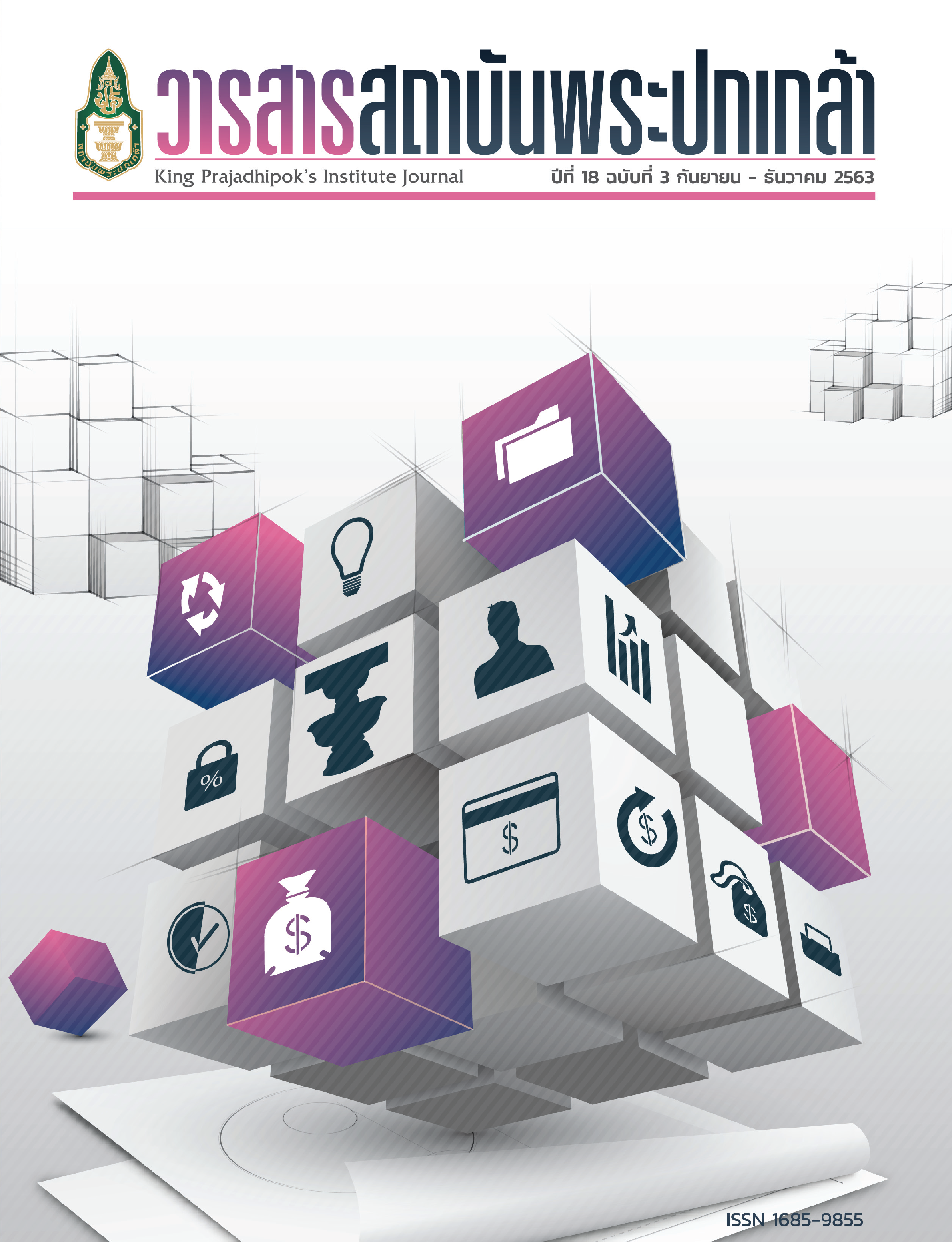Competition and Factors Affecting Victory of House of Representatives Candidates in Loei Province during the 2019 General Election
Main Article Content
Abstract
The objectives of this research are to study political competition, specifically the factors affecting victory in Loei Province in the March 24, 2019 general election and the relationships between politicians and political parties during the election. Data were collected from documents and in-depth interviews with MP candidates, local politicians, canvassers, community leaders and voters. The results showed that the political competition in Loei province was between three political parties: Pheu Thai, Bhumjaithai and Palang Pracharath. Factors affecting the voters’ decisions were the political party affiliation of the MP candidate, as most voters in Northeastern Thailand still support the defunct Thai Rak Thai Party (now Pheu Thai), and also tight network building between the national party and local politicians. The latter was evident in Electoral District 3, where one candidate affiliated with Bhumjaithai who enjoyed a firm relationship with well-known local politicians in the Provincial Administrative Organization (PAO) was able to defeat the Pheu Thai candidate, as well as the Palang Pracharath candidate, who was a several-time former MP in this electoral district.
Article Details
@ 2020 King Prajadhipok's Institute The Government Complex Commemorating All Right Reserved.
References
คณะกรรมการร่างรัฐธรรมนูญ. ตารางความเห็นต่อร่างพระราชบัญญัติประกอบรัฐธรรมนูญว่าด้วยพรรคการเมือง พ.ศ. ... . สืบค้นจาก http://cdc.parliament.go.th/draftconstitution2/ewt_dl_link.php?nid=1053&filename=draftconreleate2
โครงการอินเทอร์เน็ตเพื่อกฎหมายประชาชน. (2562ก). ใครเป็นใครใน ส.ส.เขต พลังประชารัฐ. สืบค้นจาก https://ilaw.or.th/node/5277
โครงการอินเทอร์เน็ตเพื่อกฎหมายประชาชน. (2562ข). เลือกตั้ง 62: เปิดจุดเด่น 8 พรรค เขามีดีอะไรเราถึงต้องเลือก. สืบค้นจาก https://ilaw.or.th/node/5236
นักการเมืองท้องถิ่น คนที่ 1. (2562, 22 พฤษภาคม). สัมภาษณ์.
นักการเมืองท้องถิ่น คนที่ 2. (2562, 22 พฤษภาคม). สัมภาษณ์.
ปรีชา’ พาเมียซบ ‘พปชร.’ เชื่อปชช.ฉลาดเลือก. (2561, 19 พฤศจิกายน). กรุงเทพธุรกิจ. สืบค้นจาก https://www.bangkokbiznews.com/news/detail/818917
ปรีชา : ผู้ดูแล 5 จังหวัดอีสานตอนบน พปชร. (2561, 17 ธันวาคม). สปริงนิวส์. สืบค้นจาก https://www.springnews.co.th/column/ko22nnaikhao/403465
ปรีชา เร่งสมบูรณ์สุข พปชร. ลั่น ไม่ได้ขายตัวตามที่ถูกโจมตี. (2562, 7 มีนาคม). คมชัดลึก. สืบค้นจาก https://www.komchadluek.net/news/hotclip/364807
ผู้สมัครสมาชิกสภาผู้แทนราษฎรจังหวัดเลย คนที่ 1 (2562, 25 พฤษภาคม). สัมภาษณ์.
ผู้สมัครสมาชิกสภาผู้แทนราษฎรจังหวัดเลย คนที่ 2 (2562, 22 พฤษภาคม). สัมภาษณ์.
ผู้สมัครสมาชิกสภาผู้แทนราษฎรจังหวัดเลย คนที่ 3 (2562, 25 พฤษภาคม). สัมภาษณ์.
พระราชบัญญัติประกอบรัฐธรรมนูญว่าด้วยพรรคการเมือง. (2561, 12 กันยายน). ราชกิจจานุเบกษา. เล่ม 135 ตอน 68 ก. น. 40-97.
เวียงรัฐ เนติโพธิ์. (2558). หีบบัตรกับบุญคุณ: การเมืองการเลือกตั้งและการเปลี่ยนแปลงเครือข่ายอุปถัมภ์. เชียงใหม่: ศูนย์ศึกษาอาเซียน มหาวิทยาลัยเชียงใหม่.
ศิวัช ศรีโภคางกุล, อรรถพล เมืองมิ่ง, ถนอมวงศ์ สูรยสิมาพงษ์, ฌาน เรืองธรรมสิงค์ และเทอดศักดิ์ ไป่จันทึก. (2562). การศึกษารูปแบบ วิธีการ และผลกระทบการเลือกตั้งภายใต้รัฐธรรมนูญใหม่ จังหวัดเลย. กรุงเทพฯ: สถาบันพระปกเกล้า.
สก๊อต, เจมส์ ซี. (2543). การเมืองในระบบผู้อุปถัมภ์กับผู้รับอุปถัมภ์และการเปลี่ยนแปลงทางการเมืองในเอเชียตะวันออกเฉียงใต้ (ปรีชา คุวินทร์พันธุ์, แปล), ใน อมรา พงศาพิชญ์ และปรีชา คุวินทร์พันธุ์, (บรรณาธิการ), ระบบอุปถัมภ์. (หน้า 41-136). กรุงเทพฯ: สำนักพิมพ์แห่งจุฬาลงกรณ์มหาวิทยาลัย.
สุรชาติ บำรุงสุข. (2562, 11 สิงหาคม). รัฐบาล Transformer นายกทหารคุมกองทัพได้ แต่คุมสภาไม่ได้. ประชาชาติธุรกิจ. สืบค้นจาก https://www.prachachat.net/politics/news-359578
สำนักงานคณะกรรมการการเลือกตั้ง. (2562). ข้อมูลพรรคการเมืองที่ยังดำเนินอยู่. สืบค้นจาก https://www.ect.go.th/ect_th/download/article/article_20190124073441.pdf
หทัยกาญจน์ ตรีสุวรรณ. (2562, 11 กรกฎาคม). เพื่อไทย : ถอดบทเรียนเลือกตั้ง 2562 กับ สถานการณ์ใหม่ “ชนะเลือกตั้ง แต่ตั้งรัฐบาลไม่ได้”. บีบีซีไทย. สืบค้นจาก https://www.bbc.com/thai/thailand-48950003
Dahl, R., A. (1971). Polyarchy. New Haven: Yale University Press.
Diamond, L and Morlino, L. (2004). The Quality of Democracy: An Overview. Journal of Democracy, 15(4), 20-31.
Freidenberg, F. & Levitsky, S. (2006). Informal Institutions and Party Organization in Latin America. In G. Helmke & S. Levitsky (Eds.), Informal Institutions and Democracy: Lessons from Latin America (pp. 178–197). Baltimore: The Johns Hopkins University Press.
Karl, T., L. (2005). From Democracy to Democratization and Back: Before Transitions from Authoritarian Rule. CDDRL Working Paper 45. California: Stanford University.
Linz, J. & Stefan, A. (2001). Toward Consolidated Democracies. In L. Diamond & M.F. Plattner (Eds.), The Global Divergence of Democracy (pp. 14-33). Baltimore: Johns Hopkins University Press.
McCargo, D. (1997). Thailand’s Political Parties: Real, Authentic and Actual. In K. Hewison (Ed.), Political Change in Thailand: Democracy and Participation (pp. 114–131). London: Routledge.
Ockey, J. (2017). Team Work: Shifting Patterns and Relationships in Local and National Politics in Thailand. Journal of Social Issues in Southeast Asia, 32(3), 562-600.
Sawasdee, S., N. (2006). Thai Political Parties in the Age of Reform. Bangkok: Institute of Public Policy Studies.
Schmitter, P., C. & Karl, T., L. (1991). What Democracy Is…and Is Not. Journal of Democracy, 2(3), 75-88.


